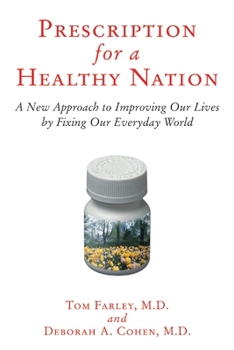Prescription for a Healthy Nation: A New Approach to Improving Our Lives by Fixing Our Everyday World
Select Format
Select Condition 
Book Overview
Introducing a new way of thinking about health: public health experts Tom Farley and Deborah A. Cohen show us that the antidote to our ever-growing rates of obesity and chronic diseases, such as heart... This description may be from another edition of this product.
Format:Paperback
Language:English
ISBN:0807021172
ISBN13:9780807021170
Release Date:May 2006
Publisher:Beacon Press
Length:296 Pages
Weight:0.94 lbs.
Dimensions:0.8" x 6.1" x 9.1"
Customer Reviews
3 ratings
One Of The Most Important Books In Public Health To Date
Published by Thriftbooks.com User , 15 years ago
The title says it all - this is quite simply one of the most important books in public health to date. The authors, Farley and Cohen, make a convincing case against the "education" model of public health that has failed, so far, to prevent or remedy the societal ills of smoking, obesity, heart disease and violence. We have normalized bad health and bad habits in our society - being overweight is not unusual, nor is heart disease or even violence. The focus of public health intervention has followed one of two typical paths - either interfere directly with the extreme cases, such as chronic alcoholics or morbidly obese individuals, or to publish a pamphlet and trust in people to make the right decision on their own. While this is a gross oversimplification it brings up two important points. We know that education is ineffective - look at D.A.R.E., which is well funded and well supported but has ultimately had no effect on drug consumption among its graduates. Anti-obesity education by public health officials cannot compete with an environment that fosters overconsumption. Billions of dollars are spent on advertising "junk food", high calorie colas, sugary cereal and snacks (particularly to children). Through sixty years of marketing research everything from an advertising campaign to the placment of an item on a grocery store shelf is calculated to get the most yield - consumption - per dollar spent. A few million a year on a public health campaign cannot compete with that. Medicine has always focused on the "bad apples", those that are sick and need attention. We are infatuated with dramatic interventions such as massive weightloss in formerly obese patients, or liver transplantation in chronic alcoholics. These extreme cases represent only a very tiny portion of the overall population and a fraction of overall costs related to a particular behavior. Small measures that will in all liklihood not affect the extremes of unhealthy behavior. If everyone in the country who was only slightly overweight dropped five pounds then as a nation we are much healthier and have done more to save on healthcare costs than would be seen in 10,000 gastric bypasses. Lastly there is the radical notion of "healthscaping" - changing our environment to make us healthier. Things like designing more walkable and bikable neighborhoods will encourage exercise, or discouraging spur-of-the-moment drinking by barring the sale of prechilled beer, are small things that can be done to make us a healthier society. It's not a new concept - we made our environment healthier by installing sanitary sewers and making access to clean drinkable water almost universal, saving more lives at a stroke than interventional medicine has in its entire history. This is a very powerful book and should be required reading for anyone hoping to be involved in medicine, public health, health law, health policy or breathing.
The future of public health
Published by Thriftbooks.com User , 15 years ago
This book clearly and concisely lays out what must be done to reign in the major killers of our time, such as heart disease, diabetes, obesity, and injuries. Right off the bat, the authors present formidable evidence showing that access to health care is not the answer to ending these problems. From there, a strategy is laid out showing just EXACTLY what we can do as a nation to curb the modern epidemics. The authors base their strategy on the groundbreaking work done by epidemiologist Geoffrey Rose Rose's Strategy of Preventive Medicine, as well as classic public health experts like Edwin Chadwick and John Snow. The book is convincing, logical, and backed up by a huge amount of new and old evidence. This is cutting edge public health and it is what students of medicine and public health are being taught in the classroom.
Great writing, good ideas - best quick read in public health
Published by Thriftbooks.com User , 19 years ago
There have been a number of recent books about health habits and the environment, but this is by far the most enjoyable read. The writing is outstanding and not the clunky prose you often encounter in books written by academics - I wish I could write like them. Although written for a general audience, with (good) human interest anecdotes, the book nevertheless covers some deeper ideas, such as "curve shifting". The idea is that how often we encounter extreme outcomes, whether severe obesity, alcoholism, HIV, depends on "normal" or average behavior in the population. The early chapters that elaborate on those ideas alone are worth reading the book. I don't care too much about "passionate advocacy" and while the authors do fall into the advocacy camp, there is very little of the whining or scolding that has turned me off in other related books. Instead, arguments are generally well balanced even if you know on which side the authors are going to come down. It made a great read for a long flight.





